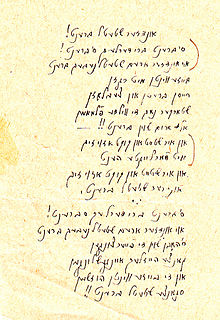Es brent (עס ברענט "It's burning", also known as אונדזער שטעטל ברענט undzer shtetl brent "our town is burning", in Hebrew translation העיירה בוערת) is a Yiddish poem–song written in 1936 by Mordechai Gebirtig. Es Brent is generally said to have been written in response to the Przytyk Pogrom of 1936. After the Holocaust, the song was also often used in Holocaust commemoration or in programmes of World War II Ghetto music, both in the original Yiddish and in Hebrew translation.[1][2] Although Gebirtig wrote prolifically, Es Brent became his best-known composition.[3]

History
editMost accounts agree that Gebirtig wrote the song in 1937 as a response to the pogroms in Przytyk (1936) and Brest (1937) and that he began to perform it, with some variations in the text, in coffee houses and other places in the late 1930s.[3] This is attested in a number of memoirs written after the war.[4] However, others who were alive at the time dispute a specific link to those pogroms and considered it a general protest against rising antisemitism in Poland.[3] One aspect observed in a number of recollections is that the opening melody of the song sounded exactly like the fire engine sirens in Krakow at the time.[3]
By 1939, with the changing political situation in Europe, he had changed the final line of the poem from "if the town is dear to you" to "if life is dear to you."[4] Rising antisemitic censorship in Poland also made it so that Gebirtig was occasionally forbidden to perform the song in public.[3]
During the war, the song was adopted by Jewish Partisans against the Nazi regime, particularly in Kraków. According to some recollections, whistling its melody was used as a code by imprisoned resistance fighters in the Montelupich Prison.[5]
After the Second World War, attempts were made to publish Gebirtig's songs, including efforts to document and transcribe versions that had not been written down but only performed. Some such publications include the Jewish Historical Committee in Kraków with their 1946 anthology, and the one put out by the Workman's Circle in 1948.[5] The song was also incorporated into the material of a Zionist youth choir in Bucharest; its leader Itzchak Artzi had learned it from concentration camp survivors from Poland.[3]
Performances and adaptations
editMany performances and adaptations of this song have been done in Yiddish, Hebrew, English, and other languages.
The Yiddish version has been recorded by dozens of artists, including Sidor Belarsky,[6] Sarah Gorby,[7] The Workman's Circle Chorus,[8] Louis Danto,[9] and Bente Kahan.[10]
In Hebrew translation, it has been recorded by Israeli singer Dorit Reuveni and performed in a Metal music adaptation by Salem.[11] The poem was also thematically incorporated into a Hebrew-language book by Shalom Hulewsky which was named after its Hebrew translations (Hayara Boeret).[3]
In 2020 Mark Rubin released his own English translation and adaptation with a new melody.[12] Several versions of the poem have been recorded. and British band Oi Va Voi recorded a version with modified Yiddish lyrics for their album Travelling the Face of the Globe.
References
edit- ^ Shandler, Jeffrey (2014). Shtetl : a vernacular intellectual history. New Brunswick, New Jersey: Rutgers University Press. p. 43. ISBN 9780813562742.
- ^ "Our Town is Burning". The Holocaust Encyclopedia. Retrieved 9 February 2021.
- ^ a b c d e f g Gebirtig, Mordecai; Schneider, Gertrude (2000). Mordechai Gebirtig : his poetic and musical legacy. Westport, Connecticut: Praeger. pp. 33–5. ISBN 9780275966577.
- ^ a b Gebirtig, Mordecai; Schneider, Gertrude (2000). Mordechai Gebirtig : his poetic and musical legacy. Westport, Connecticut: Praeger. p. 2. ISBN 9780275966577.
- ^ a b Gebirtig, Mordecai; Schneider, Gertrude (2000). Mordechai Gebirtig : his poetic and musical legacy. Westport, Connecticut: Praeger. p. 4. ISBN 9780275966577.
- ^ Remember - Songs of the Holocaust (LP). Various. World Federation of the Bergen Belsen Survivors.
{{cite AV media notes}}: CS1 maint: others in cite AV media (notes) (link) - ^ Les chants du Ghetto (LP). Sarah Gorby. Paris: Ricordi. 1962.
{{cite AV media notes}}: CS1 maint: others in cite AV media (notes) (link) - ^ Songs of Freedom and Resistance (LP). The Workmens Circle Chorus. New York City: Workmen's Circle Educational Department. 1983.
{{cite AV media notes}}: CS1 maint: others in cite AV media (notes) (link) - ^ Songs of Holocaust and Heroism (CD). Louis Danto. Downsview, ON: Cadenza Records. 1993.
{{cite AV media notes}}: CS1 maint: others in cite AV media (notes) (link) - ^ Jiddishkeit (CD). Bente Kahan. Victrola Record. 1992.
{{cite AV media notes}}: CS1 maint: others in cite AV media (notes) (link) - ^ BIOGRAPHY.
- ^ "It's Burning, by Mark Rubin". Bandcamp. Retrieved 9 February 2021.
External links
edit- "Es brent." Archival recording from the David Boder collection at the United States Holocaust Memorial Museum, via Music and the Holocaust website sponsored by World ORT
- English translation of the poem by Murray Citron on the Yiddish Book Center site